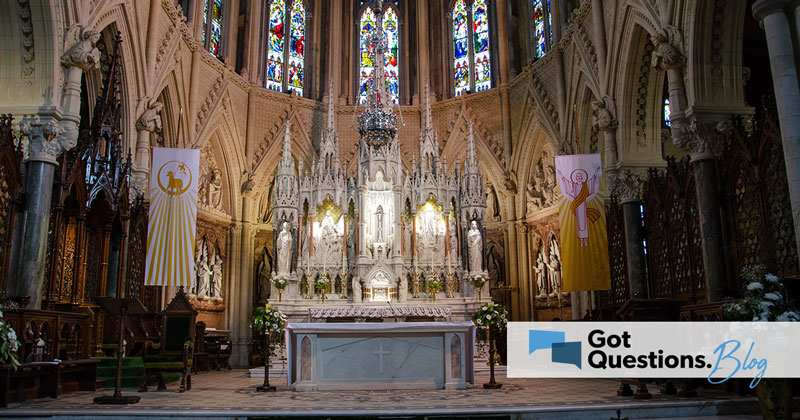
The Haters: Roman Catholicism
In part 2 of the "Haters" series, I'm going to go a slightly different direction with Roman Catholicism. We at GotQuestions.org have some strong and serious disagreements with Roman Catholic theology and practice. However, unlike some other groups, when Roman Catholics express their disagreement with us, they are generally respectful. My frustration with Roman Catholicism is not necessarily that Roman Catholics hate us, but rather the fact that Roman Catholics often, after reading our articles, come away with the impression that we hate them.
Let me say clearly and explicitly, I do not hate Roman Catholics. The vast majority of my extended family are Roman Catholics. I love them dearly and always treat them with kindness and respect. While I have had heated dialogues with Roman Catholics in the past, I have always tried to keep the focus on the doctrine, not the person. I think some of the misperception is due to how strongly we disagree with many aspects of Roman Catholicism. When we confront Roman Catholic doctrine, attacking it to its very core, it can be interpreted as a personal attack when it is not intended to be. In all my discussions with Roman Catholics, I am convinced that some of them are truly trusting in Jesus Christ alone for their salvation. Many in the Roman Catholic Church are my brothers and sisters in Christ. It is my contention, though, that they are believers despite Roman Catholicism, not because of it.
So, while I definitely do not hate Roman Catholics, there are several doctrines of the Roman Catholic Church that I do, in fact, hate:
(1) The "we were here first" argument. Roman Catholicism claims that it is the church that was established by the apostles, and that, as a result, it is the one true church. When I read the New Testament, however, the church I see is most definitely not the Roman Catholic Church. In the New Testament church, there is no pope, no cardinals, and no priests. There is no infant baptism, apostolic succession, worship of Mary, or prayer to saints. In the New Testament, the Lord's Supper is a remembrance of Jesus' once for all sacrifice, not a continual re-presentation of that sacrifice. The "we were here first" argument does not match the New Testament evidence and does not have validity except on school playgrounds.
(2) The "we gave you the Bible" argument. Roman Catholicism claims that it decided what books belong in the Bible, and therefore, has authority over the teachings of the Bible. If that were the case, they did a very poor job of selecting books which support their beliefs. If that were the case, Roman Catholicism has provided its opposition with a book by which most Roman Catholic doctrines can be soundly refuted. But, it is not the case. God gave us the Bible (2 Timothy 3:16-17). Yes, God used the early church to canonize the Bible, but God was completely sovereign over the entire process. Yes, the early church councils that canonized the Bible may have been quasi-Catholic in some areas, but they absolutely were not Roman Catholic in the modern sense. No, Roman Catholicism did not give us the Bible. God gave us the Bible.
(3) The "30,000 Protestant denominations" argument. Roman Catholics argue against the Protestant concept of sola scriptura (the Bible alone) by pointing to the supposed results of sola scriptura, which is, in their minds, a terribly divided body of Christ in the form of 30,000+ Protestant denominations. The problem with this argument is that it incorrectly blames sola scriptura for the divisions within Protestantism. Sola scriptura is not the problem. The misapplication of sola scriptura is the problem. We all allow, to varying degrees, our traditions, preferences, and preconceptions to impact our theology. We all interpret biblical passages inconsistently due to our inherent biases. We are all fallen and imperfect human beings. Therefore, we will always be prone to mistakes in our understanding of God's Word. But, sola scriptura is not the problem. Not fully applying sola scriptura is the problem.
Further, one thing all 30,000 Protestant denominations agree on is the fact that the Roman Catholic Church is very wrong on numerous very important issues. The disagreements Protestant churches have between each other are miniscule in comparison to the disagreements between Protestantism and Roman Catholicism. Even within the Roman Catholic Church, there are many Catholics who do not agree with various doctrines of their own church. Due to culture, tradition, and belief that the Roman Catholic Church is the one true church, though, they choose to remain in the Catholic Church rather than dividing and starting new churches.
There is much more I could say, but for now, I think I have made my point. GotQuestions.org does not hate Roman Catholics. What we hate is the false doctrines, false practices, and invalid arguments the Roman Catholic Church teaches. I entirely understand that when the church you love is attacked, it is painful, and can sound hateful. But, Roman Catholics, please understand that our expressions of strong disagreement are a result of a love for God's Word, and love for the one true church, which is every person who receives Jesus Christ as Savior, by grace through faith.
S. Michael Houdmann
GotQuestions.blog homepage
The Haters: Roman Catholicism